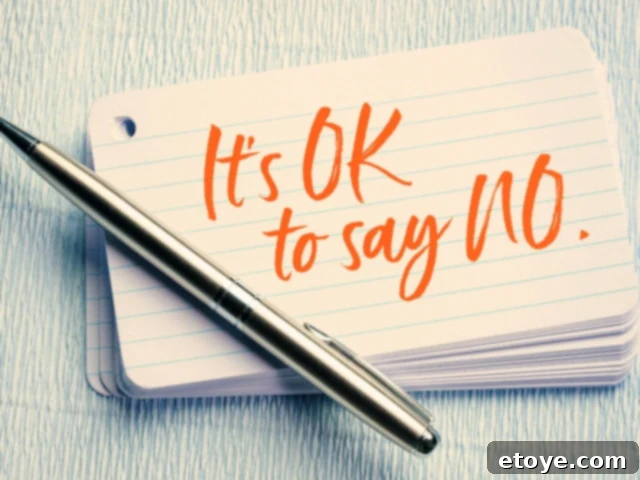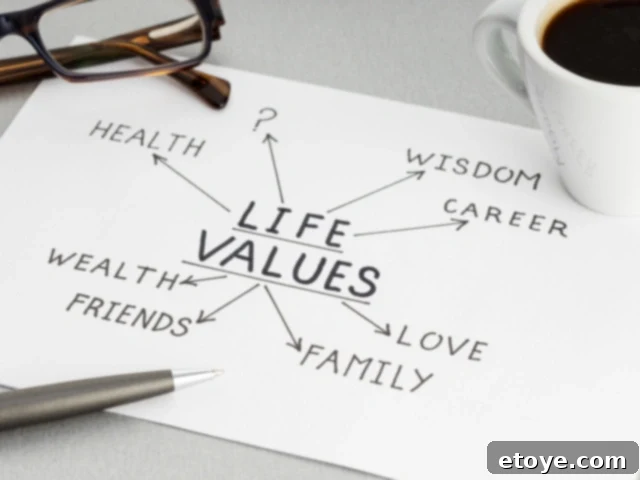Welcome to a New Year, a fresh start, and an opportunity to truly transform your life! The festive shimmer has faded, and the last remnants of celebratory chaos are being tidied away. For a fleeting, wonderful moment, the air is thick with possibility. Yet, all too often, this optimism quickly gives way to the familiar pattern of overcommitment, feeling stretched thin, and saying “yes” to obligations that drain our precious time and energy.
But what if this year could be different? What if we consciously chose to step away from the relentless churn of external demands and instead cultivated a deeper sense of inner peace and intentional living? This profound shift begins with one crucial practice: mastering the art of setting personal boundaries.

Why Setting Boundaries is Essential for Your Well-being
Think of boundaries as the invisible fences that protect the most sacred aspects of your life. They aren’t about building walls to keep people out, but rather about creating a safe, defined space where your mental health, emotional well-being, physical energy, and personal values can flourish. Without clear boundaries, we often find ourselves adrift, pulled in countless directions by the needs and expectations of others. This leads to burnout, resentment, and a profound lack of energy for the things that truly matter: our personal growth, pursuing our passions, and nurturing the close, authentic relationships that nourish our souls.
It’s entirely understandable if the thought of setting boundaries, particularly with close family members, dear friends, or professional figures, feels daunting. The fear of awkward conversations, potential disappointment, or even conflict can be paralyzing. However, the long-term benefits of establishing and maintaining healthy boundaries far outweigh the temporary discomfort. Every small moment of time and energy you relinquish because it felt uncomfortable to decline adds up rapidly, creating a cumulative toll on your well-being that is impossible to reclaim. By proactively defining and defending your personal limits, you are making an invaluable investment in your future self – an investment that pays dividends in peace, purpose, and genuine connection.

Embracing the Transformative Power of Saying No
If the whirlwind of the holiday season taught us anything, it’s that saying “no” isn’t an act of selfishness; it’s an act of self-preservation. Whether it means gracefully declining a third round of family gatherings, opting out of an exhausting social event, or simply saying no to an extra task at work, each refusal creates vital space. This newfound space can then be filled with what you genuinely value: precious alone time for reflection, quality moments with your most cherished people, dedicating time to a beloved hobby, or even simply enjoying a well-deserved, guilt-free nap.
It’s a simple yet profound truth: every “yes” you give to someone else, especially when it goes against your needs, is a “no” to yourself. This isn’t about being unhelpful or uncaring. It’s about recognizing your finite resources and making conscious choices about where you direct your energy. You have a right to protect your peace, and frankly, you deserve to prioritize your own well-being. By embracing the power of “no,” you cultivate a life that is less about reaction and more about intention, ensuring that your most valuable resources are allocated to what truly matters to you.

Actionable Strategies for Setting Clear and Effective Boundaries
Establishing clear boundaries is a skill that can be learned and refined. Here’s a practical framework to guide you:
- Identify Your Core Needs and Limits: Before you can articulate or defend a boundary, you must first understand what it is you need to protect. Dedicate some quiet time to honest self-reflection. What activities, interactions, or demands consistently leave you feeling drained, overwhelmed, or resentful? Is it an unmanageable workload, the constant pull of social media, undefined work hours, or perhaps a pattern of always being the “fixer” for others? Recognizing these energy leaks and understanding your personal limits is the foundational first step towards safeguarding your well-being. This self-awareness empowers you to define what is truly acceptable and unacceptable in your life.
- Communicate Your Boundaries Openly and Respectfully: Once you’re clear on your needs, the next critical step is to communicate them. Honesty, clarity, and directness are paramount. Whether you’re addressing a life partner, a colleague, a supervisor, or a well-meaning but overbearing family member, use “I” statements to express your needs without blame or accusation. For example, instead of saying, “You always expect too much from me,” try, “I’ve realized I need more time to recharge my energy, so I won’t be able to commit to weekly dinners this year, but I’d love to join once a month.” This approach focuses on your feelings and needs, making the boundary easier for others to understand and respect. Remember to be specific about what the boundary entails.
- Practice Consistent Enforcement: A boundary, no matter how well-defined or communicated, only truly exists if it is consistently enforced. This is often the most challenging but crucial step. If you’ve decided to limit checking work emails to specific hours, stick to it, even when it feels difficult. If you’ve committed to a new self-care routine, make it a non-negotiable appointment. Consistency sends a clear message to those around you that your boundaries are serious and deserve respect. Over time, people will learn to adapt to and honor your limits, and you will increasingly feel empowered, respected, and in control of your own life rather than a “doormat.”
Overcoming Boundary Guilt: A Path to Healthier Relationships
One of the most formidable obstacles to setting boundaries is the pervasive feeling of guilt. Many of us, especially women, have been conditioned from a young age to prioritize the needs and feelings of others above our own. This societal programming can make asserting personal limits feel selfish or unkind. However, it’s essential to reframe this perspective: healthy boundaries are not about pushing people away; they are the bedrock of healthier, more authentic relationships.
When you respect your own limits, you are, in essence, teaching others how to respect you. This creates a positive ripple effect, fostering environments of mutual respect and understanding. In my own experience, a remarkable transformation occurs when one becomes more direct and unequivocal about their needs and communicates them clearly. It alleviates the pressure on others to constantly guess your comfort level or desires, ending the stifled, awkward dance of mutual reassurance (“Is this okay? Are you okay? How can I make you feel okay?”). When you bravely embrace your authentic self and communicate transparently, you not only put yourself at ease but often inspire those around you to do the same, fostering deeper, more genuine connections free from guesswork and trial-and-error. It’s a genuine favor you’re extending to everyone involved.
Should guilt inevitably creep in, gently remind yourself that saying “no” does not diminish your kindness; it enhances your intentionality. It’s about consciously creating room for what genuinely enriches your life, rather than stretching yourself to the point of breaking while attempting to satisfy every external demand. The timeless adage holds true: you cannot pour from an empty cup. Nurturing your own well-being allows you to show up more fully and authentically for others when it truly matters.

Aligning Your Life with Your Deepest Values
While often perceived as an act of restriction, boundary setting is equally, if not more, about intentional expansion. It’s about creating the capacity to say a resounding “yes” to the pursuits and people that truly ignite your spirit and align with your core values. Whether your aspirations include dedicating more time to healthy eating, passionately pursuing a new skill, or meticulously cultivating a sustainable work-life balance, boundaries serve as the indispensable first step. They are the scaffolding upon which you build a life that is truly reflective of your priorities.
Embrace this new year as an empowering opportunity to integrate personal boundaries as a profound act of self-love and self-respect. Do you yearn for more quality, uninterrupted time with your partner or children? Proactively block off those evenings in your schedule, treating them as non-negotiable appointments. Do you need to safeguard your emotional health from negativity? Courageously mute or exit toxic group chats that deplete your energy. Life is far too short and precious to spend it perpetually people-pleasing at the expense of your own authentic happiness, fulfillment, and peace of mind. Your well-being is a priority, not an afterthought.
Debunking Common Myths About Setting Boundaries
Let’s clarify some prevalent misconceptions that often hinder people from embracing boundary setting:
Myth #1: Boundaries are inherently selfish.
This is perhaps the most common misconception. In reality, healthy boundaries are a compassionate and effective way to ensure that everyone’s needs – including your own – are acknowledged and met. What is actually closer to selfish? Consistently being dishonest with others about your true feelings, desires, or capacity, simply to maintain an image of agreeableness or to avoid conflict. When you begin to reframe people-pleasing behaviors as what they often are (a form of dishonesty employed to stay liked or keep a superficial peace), you realize that saying “yes” to everything is ultimately a disservice to both yourself and others. Authentic relationships thrive on honesty, not endless accommodation.
Myth #2: Setting boundaries pushes people away.
On the contrary, well-established boundaries fortify relationships by cultivating an environment of mutual respect, trust, and understanding. When you clearly communicate your limits, you provide a blueprint for others on how to interact with you in a way that feels safe and honorable for both parties. If someone consistently refuses to respect your boundaries, it suggests a deeper lack of respect or understanding in that relationship. In such cases, it prompts an important self-reflection: Is this truly the kind of dynamic you wish to cultivate in your life, and is this person genuinely supporting your well-being?
Myth #3: Once set, boundaries are permanent and rigid.
This is far from the truth. Healthy boundaries are dynamic and should evolve and adapt as your life circumstances, priorities, and personal growth dictate. What served you well last year might no longer align with your goals, values, or energy levels for the current year, and that is perfectly acceptable. Periodically revisiting and adjusting your boundaries is a sign of self-awareness and healthy self-management.
Myth #4: Boundaries are about controlling other people’s behavior.
This is a critical distinction. True boundaries are fundamentally about defining what you will and will not accept or tolerate, and what actions you will take based on those limits. They are not about dictating or manipulating others’ actions. For instance, a boundary is not, “You cannot speak to me in that disrespectful tone.” Instead, a healthy boundary is articulated as, “If you continue to speak to me disrespectfully, I will remove myself from this conversation.” The focus remains firmly on your own actions, choices, and personal limits, ensuring that the boundary is both respectful and within your direct control.

Practical Examples of Boundaries Across Life’s Domains
Boundaries are deeply personal and manifest differently for everyone. Here are some concrete examples across various aspects of life:
- Work Life: This could involve clearly defining your working hours and refraining from checking or responding to emails after a certain time, such as 6 PM. It might also mean politely but firmly declining additional projects that would push you past your capacity or disrupt your crucial work-life balance. For example, “I’m currently at full capacity for new projects, but I appreciate you thinking of me. Let’s revisit this next quarter.”
- Family Dynamics: Setting boundaries with family often requires navigating deeply ingrained patterns. This could mean politely yet firmly declining to get involved in family drama, or setting specific limits on holiday commitments. An example might be, “I would love to attend one holiday event this year, but I won’t be able to make all three due to other commitments I’ve made.” It can also include limiting the frequency or duration of visits, or the topics of conversation you’re willing to engage in.
- Social Media: To protect your mental and emotional health, this might involve scheduling specific times for social media engagement, taking regular digital detox breaks, or muting/unfollowing accounts that consistently trigger negative emotions, comparison, or anxiety. Limiting your daily scrolling time to a set duration (e.g., 30 minutes) can free up a significant amount of precious mental space and reduce feelings of being overwhelmed.
- Daily Life and Personal Time: This category is about safeguarding your personal sanctuary. Schedule dedicated time for yourself – whether it’s for reading, exercising, meditating, pursuing a hobby, or simply enjoying a cup of coffee in serene peace. Treat these blocks of time as utterly non-negotiable appointments with yourself, just as you would a doctor’s visit or a work meeting. This ensures you consistently replenish your energy stores.
Navigating Pushback and Resistance
It’s important to acknowledge that not everyone will immediately embrace your new boundaries, especially if they are accustomed to you always saying “yes.” When faced with resistance, whether overt or subtle, the key is to remain calm, firm, and consistent. Reiterate that your decision isn’t a personal attack but a necessary act of honoring your own needs and well-being. For example, you might say, “I understand you’re disappointed/upset, but I need to focus on prioritizing my mental health and energy right now, and this is what I need to do for myself.”
Another effective strategy is to frame your boundary in a way that emphasizes mutual respect and even the positive impact it will have on your interactions. For instance, “I genuinely value our time together, and by setting these boundaries, I ensure that when we do spend time together, I can be fully present and engaged, rather than feeling drained.” Remember, their reaction is about them, not you. Your responsibility is to yourself, and with consistency and clear communication, most people will eventually learn to respect your limits.

The Profound and Lasting Benefits of Setting Boundaries
The positive ripple effects of establishing healthy personal boundaries are truly extensive and transformative. You’ll experience significantly reduced stress levels, a notable surge in your energy reserves, and the newfound capacity to dedicate yourself to genuine personal growth and meaningful pursuits. As you consistently honor your limits, you’ll naturally cultivate healthier, more balanced relationships built on mutual respect. You’ll find yourself achieving new goals, living a life that feels authentically aligned with your deepest values, and experiencing a profound sense of inner peace and contentment.
Boundary setting also paves a clear path toward greater emotional resilience. When you are unequivocally clear about your limits, you spend considerably less time and energy embroiled in unnecessary conflicts, draining misunderstandings, or obligations that ultimately do not serve your highest good. This conserved energy becomes available for more constructive and fulfilling endeavors.
Furthermore, when you proactively set boundaries, you are sending a powerful and unequivocal message to both yourself and to those around you: your time, your energy, and your overall well-being truly matter. This consistent affirmation acts as a powerful builder of self-confidence and steadfastly reinforces your intrinsic sense of self-worth. This internal strengthening makes it significantly easier to prioritize what genuinely resonates with your core values and contributes to your authentic happiness.
Ultimately, healthy boundaries create a beautiful ripple effect that extends beyond your personal sphere. As you embody and model self-respect and dedicated self-care, you inevitably inspire those in your orbit to consider and embrace similar practices. It truly becomes a win-win scenario for everyone involved, fostering a culture of greater understanding and well-being.
Recognizing Unhealthy Boundaries and How to Adjust
While boundaries are crucial, it’s also important to recognize when they might veer into unhealthy territory. Unhealthy boundaries can manifest as shutting people out completely, isolating yourself, or paradoxically, over-committing to avoid the guilt of saying no. Signs of boundaries that might need adjustment include feeling consistently resentful, chronically burned out despite having “boundaries,” feeling constantly misunderstood, or experiencing frequent loneliness or emotional distance in relationships.
If you notice these patterns emerging, take time for honest self-reflection. Ask yourself: Are my boundaries serving my well-being and fostering healthy connections, or are they inadvertently creating new problems? Sometimes, unhealthy boundaries stem from fear (e.g., fear of intimacy, fear of conflict) rather than conscious self-protection. Reassessing your motivations and gently experimenting with more flexible or open boundaries where appropriate can lead to more balanced and fulfilling interactions. Professional guidance can also be invaluable in navigating complex boundary issues.
The Power of Starting Small: Building Boundary-Setting Momentum
If the idea of overhauling your entire life with new boundaries feels overwhelming, remember this powerful truth: every significant change begins with a single, small step. Identify just one area where you feel a clear need to establish a boundary, no matter how minor it may seem. This could be as simple as saying “no” to last-minute social plans that disrupt your evening, or carving out a mere 30 minutes of uninterrupted, sacred time for yourself each day – perhaps for reading, meditation, or simply enjoying your coffee in peace.
These initial, small victories are incredibly powerful. They serve as tangible proof that you can successfully assert your needs, building crucial confidence and momentum. Each successful boundary, no matter how minor, makes it progressively easier to expand your limits and tackle more significant challenges over time. Starting small also provides valuable practice in understanding, articulating, and defending your needs more effectively. The more you consciously practice setting boundaries, the more comfortable and natural it becomes, transforming from a daunting task into an empowering, ingrained habit.

Your Year of Intentional Living: How Will You Set Boundaries?
Forget the pressure of traditional New Year’s resolutions if they don’t resonate with you. Instead, consider adopting boundary setting as the most powerful and sustainable resolution you can make. It is arguably the single most effective strategy for reclaiming your precious time, safeguarding your vital energy, and cultivating a profound sense of inner peace and mental clarity.
This year, make a conscious, unwavering commitment to saying a resounding “yes” to calm over chaos, to intentional living over default reactions, and to nurturing your own well-being above all else. And, just as importantly, learn to say a firm “no” to everything that no longer serves your highest good, depletes your spirit, or distracts you from your true purpose.
How will you embark on your journey of practicing boundary setting this year? What specific changes will you implement to honor your needs and create a more fulfilling life? I’d genuinely love to hear about your intentions and experiences. Please feel free to share your thoughts and insights by leaving a comment below!
